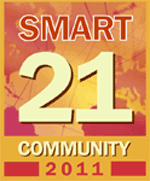Exploring the impact of broadband and technology on our lives, our businesses, and our communities.
Community fiber needs owners
Fred Pilot makes an excellent observation in his excellent blog: he says that getting fiber to homes and businesses requires a change in attitude on the part of those homeowners and businesses--a shift away from passively accepting whatever an incumbent monopoly provider offers and moving to an ownership attitude. Fred talks specifically about using a coop structure, but the point is appropriate for any community-owned network governance structure, as ultimately, the residents and businesses of the community end up taking control of their own economic destiny by building a community-owned network business.
Taking control of a community's economic future requires work--more work than just quietly paying the cable or DSL bill every month and fuming over the high cost and the poor service. It means some community leaders have to learn new skills and take on the work of managing a new kind of community infrastructure. But most communities can do this; the world's best fiber network can be built in any community for far less than the cost of putting in a public water and sewer system. Communities routinely borrow tens of millions for water and sewer and successfully manage those complex systems and pay back the debt. This is still America, and we still have the ability and know how to have the world's best infrastructure. The real question is why are so many communities willing to accept third world telecom services?
Technology News:
Danville, Virginia a 2011 Smart21 Intelligent Community

The Intelligent Community Forum announced the Smart21 cities for 2010 today. Danville, Virginia was among those cities chosen, and one of only six U.S. cities selected for the honor. Design Nine has assisted with the planning and development of nDanville since the project started in 2006. nDanville is an open access network owned and operated by the City of Danville, but residential and business services are provided by private sector companies.
Technology News:
Community news and projects:
Incumbents continue to try to stop competition
Stop the Cap! has an article about the incumbent fight to kill the nation's most successful open access network: Utopia. Utopia's open access network has thousands of subscribers and fifteen providers on the network, including three TV providers. I've actually had the opportunity to see the Utopia TV provider offerings, and the picture quality of an all digital TV channel delivered via fiber is incredible.
Has Utopia had problems? Some early financial issues developed because the first firm hired to manage the network made some decisions that have since been corrected. The management firm is long gone, and Utopia took network management and outside plant maintenance in-house almost two years ago, with excellent results. The incumbents in the area--Comcast and Qwest--have been invited repeatedly to come on the network and offer their service to their existing customers, but instead, the first seem to want to simply try to force the competition out.
The situation is unfortunate, but is being repeated in other areas of the country, where incumbents are choosing to try to force monopoly pricing onto communities instead of competing in the marketplace.
Disclaimer: The Utah Infrastructure Agency has been a client of Design Nine.
Technology News:
Community news and projects:
Broadband: Rural communities have to have it
The EPA and ICMA (International City/County Management Association) have issued a very useful and readable report on "smart growth" in rural communities. However, the word "broadband" does not appear once in the entire report, and there no mention at all of the need for access to affordable high performance broadband services. I used to say that broadband infrastructure is the current day equivalent of water and sewer with respect to economic development, but I have switched to "paved roads." Why? Many rural residents have wells and septic tanks, and will never have public water and sewer. But those residents want and need the same kind of network access that is available in urban areas. Rural communities could not prosper in the twentieth century without paved roads in most areas (yes, I know that many rural residents still live on unpaved roads), but could you imagine a twentieth century town thriving with an unpaved Main Street? Today, there are many jobs and businesses that can thrive on dirt roads if affordable high performance broadband is available. Along with the many other good recommendations in this report, broadband needs to be included as a basic economic development goal.
Technology News:
Consolidation in the telecom industry
Chris Mitchell has a short but pointed note about the fallacy of the "leave it to the private sector" policies that have received so much attention, mainly because the incumbents have pushed that approach vociferously over the past fifteen years. But Mitchell points out that it has largely failed, with many fewer ISPs than in the late nineties, and overall, fewer telephone and cable companies as the big telecom giants gobble up the smaller ones.
His final point is the most important one: to maintain some balance and to encourage real competition, there needs to be the opportunity to form and run community-owned networks that are "structurally accountable" to the community itself. Telecom and broadband services have become essential economic development infrastructure, and communities need to be able to control their own destiny. I don't subscribe to the notion that the incumbents are bad. I don't subscribe to the idea that they should be regulated out of existence. What I do believe is that community-owned broadband networks ought to be given a fair chance to prosper without the regulatory dead weight of prohibitions, restrictions, and statutory limitations on access to capital. The incumbents have had fifteen years to provide a modern fiber-based infrastructure to American homes and businesses, and they have, by their own admission, declared, "we can't do it." Fine.
Let's take them at their word, and unleash American innovation and enthusiasm to try something different, like open access networks, which have network neutrality baked in when owned and managed by a neutral third party like a community or regional consortium. Open access projects like Utopia have fifteen providers on the network, including three TV providers--that's real network neutrality and real choice, without the need for excessive regulation and complicated rule-making.
Technology News:
iPad is driving innovation

A new piece of software for the iPad demonstrates the innovation taking place within the Apple App Store software universe. SoundNote lets an iPad user take text notes that are automatically synced with an accompanying audio recording. Who would want this? Students....take your notes in class on your iPad while your iPad records the audio from the entire lecture. When you go back later to read your notes, click to hear the audio starting from wherever you are in your written notes. And it costs $5. That's right, five dollars. We have not even scratched the surface of the kind of applications that the iPad and other tablet devices are going to support.
Technology News:
Facebook security problems
The Wall Street Journal has an article about issues with the way third party Facebook apps (e.g. FarmVille, HoldEm Poker, others) are grabbing personal information even though they are not supposed to be doing so. Facebook officials said they are clamping down to ensure that the 500 million Facebook users are protected.
Technology News:
Knowledge Democracy:
Benoit Mandelbrot has passed on
Benoit Mandelbrot, who created the mathematics of chaos and complexity, has passed on. James Gleick's book Chaos: Making a New Science is, in my opinion, one of the best introductions to chaos theory, with a minimum of mathematics. As a side note, the phrase "chaos theory" is a misnomer, as Mandelbrot's major contribution was to show that the incredible complexity of nature could be modeled with very simple, almost trivial, equations.
Technology News:
Is there anything an iPhone can't do?
Four guys jammin' on a New York subway, with their, um, iPhones....better than you might think.
Technology News:
Touchy gloves

Newspapers and old media businesses may be going out of business, but entrepreneurs keep coming up with new businesses that don't rely on 200 year old business models. A UK company has come out with gloves designed for use with touchpad devices like smartphones and the iPad.